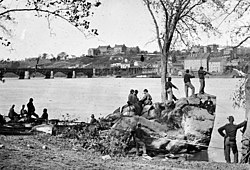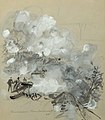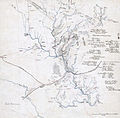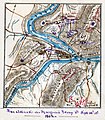Portal:American Civil War
 |
 |


The American Civil War (1861–1865) was a sectional rebellion against the United States of America by the Confederate States, formed of eleven southern states' governments which moved to secede from the Union after the 1860 election of Abraham Lincoln as President of the United States. The Union's victory was eventually achieved by leveraging advantages in population, manufacturing and logistics and through a strategic naval blockade denying the Confederacy access to the world's markets.
In many ways, the conflict's central issues – the enslavement of African Americans, the role of constitutional federal government, and the rights of states – are still not completely resolved. Not surprisingly, the Confederate army's surrender at Appomattox on April 9,1865 did little to change many Americans' attitudes toward the potential powers of central government. The passage of the Thirteenth, Fourteenth and Fifteenth amendments to the Constitution in the years immediately following the war did not change the racial prejudice prevalent among Americans of the day; and the process of Reconstruction did not heal the deeply personal wounds inflicted by four brutal years of war and more than 970,000 casualties – 3 percent of the population, including approximately 560,000 deaths. As a result, controversies affected by the war's unresolved social, political, economic and racial tensions continue to shape contemporary American thought. The causes of the war, the reasons for the outcome, and even the name of the war itself are subjects of much discussion even today. (Full article)
The Fishing Creek Confederacy was an alleged military uprising in northern Columbia County, Pennsylvania and southern Sullivan County, Pennsylvania during the American Civil War. Residents of Columbia County strongly opposed military drafts that were being conducted there, leading to widespread desertion and draft evasion. In a Columbia County draft in July 1863, 618 people were drafted. Of these, approximately 75% evaded the draft. On July 30, 1864, several people rode into northern Columbia County from Luzerne County to search for deserters, and one of the riders was shot. By the summer of 1864, rumors had begun to circulate that these deserters and draft evaders, as well as Confederate sympathizers, had built a fort with cannons on North Mountain, not far from the headwaters of Fishing Creek. This fort was supposedly manned by 500 people. Upon hearing these rumors, 1000 soldiers gathered near Bloomsburg, in Columbia County.
On August 21, 1864, the soldiers began traveling up Fishing Creek. For the next week, they searched the northern portion of Columbia County for deserters and draft evaders. They were unable to find any, but on August 28 they arrested 100 local citizens. Most were released, although some were taken to Fort Mifflin. The soldiers continued heading into the northernmost reaches of the Fishing Creek watershed. Unable to find any evidence of a conspiracy, they returned to Bloomsburg and remained in the county until December 1864. The last of the prisoners were released from Fort Mifflin several months after their arrest. (Full article...)

Mississippi was the second southern state to declare its secession from the United States, doing so on January 9, 1861. It joined with six other southern states to form the Confederacy on February 4, 1861. Mississippi's location along the lengthy Mississippi River made it strategically important to both the Union and the Confederacy; dozens of battles were fought in the state as armies repeatedly clashed near key towns and transportation nodes.
Mississippian troops fought in every major theater of the American Civil War, although most were concentrated in the Western Theater. Confederate president Jefferson Davis was a Mississippi politician and operated a large cotton plantation there. Prominent Mississippian generals during the war included William Barksdale, Carnot Posey, Wirt Adams, Earl Van Dorn, Robert Lowry, and Benjamin G. Humphreys. (Full article...)
Rutherford Birchard Hayes (/ˈrʌðərfərd/ ; October 4, 1822 – January 17, 1893) was the 19th president of the United States, serving from 1877 to 1881. A staunch abolitionist from Ohio, he was also a brevet major general for the Union army during the American Civil War.
As an attorney in Ohio, Hayes served as Cincinnati's city solicitor from 1858 to 1861. He was a staunch abolitionist who defended refugee slaves in court proceedings. At the start of the Civil War, he left a fledgling political career to join the Union army as an officer. Hayes was wounded five times, most seriously at the Battle of South Mountain in 1862. He earned a reputation for bravery in combat, rising in the ranks to serve as brevet major general. After the war, he earned a reputation in the Republican Party as a prominent member of the "Half-Breed" faction. He served in Congress from 1865 to 1867 and was elected governor of Ohio, serving two consecutive terms from 1868 to 1872 and half of a third two-year term from 1876 to 1877 before his swearing-in as president. (Full article...)
- ... that according to one historian, James S. Rains made a "significant contribution to the Confederate war effort" by getting drunk?
- ... that Carter Moore Braxton fought for the Confederacy throughout the American Civil War and, according to one report, had seven horses killed under him but avoided any wounds?
- ... that at the Battle of La Haye-du-Puits in July 1944, a Confederate flag dating to the American Civil War was raised over the town?
- ... that Colonel Bradley Winslow was brevetted by US president Abraham Lincoln for "brave and gallant conduct" during the siege of Petersburg in the American Civil War?
- ... that Chinese-born Joseph Pierce enlisted as a Union Army soldier, fought at the Battle of Gettysburg during the American Civil War, and was made a corporal?
- ... that Dubuque, Arkansas, was destroyed in the American Civil War and is now covered by the waters of Bull Shoals Lake?
- Attention needed
- ...to referencing and citation • ...to coverage and accuracy • ...to structure • ...to grammar • ...to supporting materials
- Popular pages
- Full list
- Cleanup needed
- The West Tennessee Raids
- Requested articles
- James Ashby (soldier) • Benjamin D. Fearing • James B. Speers • Charles S. Steedman • Battle of Barton's Station • Lawrence P. Graham • Frederick S. Sturmbaugh • Davis Tillson • Action at Nineveh (currently a redirect) • International response to the American Civil War • Spain and the American Civil War • Savannah Campaign Confederate order of battle • Native Americans in the American Civil War (currently disambiguation after deletion) • Battle of Lafayette • Battle of Sunshine Church • Requested American Civil War Medal of Honor recipients
- Expansion needed
- Battle of Boonsborough • Battle of Guard Hill • Battle of Rice's Station • Battle of Simmon's Bluff • Battle of Summit Point • Charleston Arsenal • Edenton Bell Battery • First Battle of Dalton • Blackshear Prison • Edwin Forbes • Hiram B. Granbury • Henry Thomas Harrison • Louis Hébert (colonel) • Benjamin G. Humphreys • Maynard Carbine • Hezekiah G. Spruill • Smith carbine • Edward C. Walthall • Confederate States Secretary of the Navy • Confederate States Secretary of the Treasury • David Henry Williams • Battle of Rome Cross Roads • Delaware in the American Civil War • Ironclad Board • United States Military Railroad • Kansas in the American Civil War • Rufus Daggett • Ebenezer Magoffin • Confederate Quartermaster-General's Department • First Corps, Army of Northern Virginia • Francis Laurens Vinton • Henry Maury • Smith's Expedition to Tupelo • Other American Civil War battle stubs • Other American Civil War stubs
- Images needed
- Battle of Lone Jack • Preston Pond, Jr. • Melancthon Smith
- Merging needed
- 1st Regiment New York Mounted Rifles and 7th Regiment New York Volunteer Cavalry
- Citations needed
- 1st Alabama Cavalry Regiment (Union) • 4th Maine Battery • 33rd Ohio Infantry • 110th New York Volunteer Infantry • Battle of Hatcher's Run • Camp Dennison • Confederate colonies • CSS Resolute • Dakota War of 1862 • Florida in the American Civil War • Ethan A. Hitchcock (general) • Fort Harker (Alabama) • Gettysburg (1993 film) • Iowa in the American Civil War • Second Battle of Fort Sumter • Samuel Benton
- Translation needed
- Add an article here!
The following Wikimedia Foundation sister projects provide more on this subject:
-
Commons
Free media repository -
Wikibooks
Free textbooks and manuals -
Wikidata
Free knowledge base -
Wikinews
Free-content news -
Wikiquote
Collection of quotations -
Wikisource
Free-content library -
Wikiversity
Free learning tools -
Wikivoyage
Free travel guide -
Wiktionary
Dictionary and thesaurus
- Shortcuts to this page: Portal:ACW • P:ACW





































































